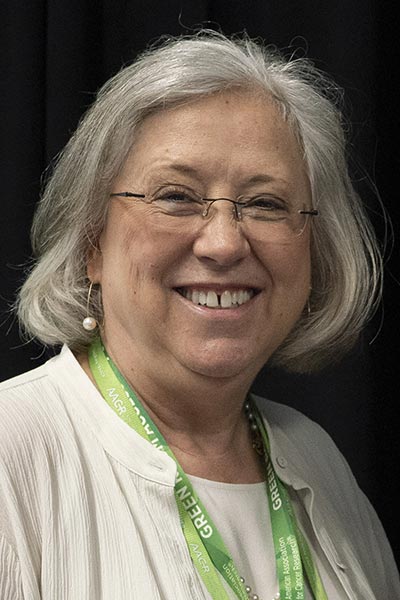NCI Director discusses Cancer Moonshot initiative and new National Cancer Plan
On February 2, 2022, President Joe Biden and First Lady Dr. Jill Biden reignited the Cancer Moonshot, setting a new goal to reduce age-standardized cancer mortality rates by at least 50 percent over the next 25 years in the U.S. Not long after, in October 2022, Monica M. Bertagnolli, MD, was sworn in as Director of the National Cancer Institute (NCI) at the National Institutes of Health (NIH).
Editor’s note: On May 15 after this article was published, President Biden announced his intention to nominate Bertagnolli as Director of the NIH.

During the NCI Director’s Address and Fireside Chat held at the Annual Meeting on Monday, April 17, Bertagnolli sat down with AACR President Lisa M. Coussens, PhD, FAACR, to discuss the NCI’s goals for the Cancer Moonshot initiative and the recently released National Cancer Plan.
“We have our work cut out for us. It will take all of us,” Bertagnolli said. “The central key to progress is collaboration. It will take all of us across all of society to take action to end cancer for all people.”
On April 3, the U.S. Department of Health and Human Services released the National Cancer Plan, which was developed by the NCI. The plan provides a framework for everyone — across the federal government and all of society — to collaborate in ending cancer and realize the vision laid out in the Cancer Moonshot.
The plan includes eight essential goals and accompanying strategies that outline what must be accomplished to prevent more cancers, reduce deaths from the disease, and improve the lives of everyone after a diagnosis with cancer. These goals are: prevent cancer, detect cancers early, develop effective treatments, eliminate inequities, deliver optimal care, engage every person, maximize data utility, and optimize the workforce.

“The interplay of each of these major goals has to be successful to achieve the real promise of cancer research, and to achieve changes in society that end cancer as we know it,” Bertagnolli said.
In conjunction with Bertagnolli’s address at the Annual Meeting, an NCI paper titled Opportunities for Achieving the Cancer Moonshot Goal of a 50% Reduction in Cancer Mortality by 2047 was simultaneously published in the AACR journal Cancer Discovery.
Things got more personal when Coussens asked Bertagnolli about her breast cancer diagnosis, which she announced publicly in December 2022. Bertagnolli said her diagnosis has not changed how she approaches her work at the NCI, but it has reinforced the importance of fundamental research. Between molecular analyses of her tumor and participation in a clinical trial, she realized all her treatments originated from cancer research.
Bertagnolli has been able to access quality care, but, she noted, not everyone has that privilege. Access to treatment, insurance coverage, and a community’s relationships to health care providers must be considered when new technologies, treatments, and policies are created, she said.
There are a lot of people working at the community level to improve access to care, Bertagnolli noted, but many of them haven’t been properly funded. She said the NCI can help by connecting with community leaders to bolster programs that are tailored to a community’s needs.
“We need to invest in the people who truly know how to do this, and there are some really brilliant ones who are already leading the way,” said Bertagnolli, adding that patients trust providers who are already involved in their community. “It takes deep integration into the communities that have been left out.”
The issue of funding was a recurring theme throughout the discussion. Bertagnolli said that although the NCI’s overall budget had just increased, the government must continue investing in the institute. Year-on-year investment must stay steady to keep cancer research moving forward, she said.
“[Research] is the backbone of everything we do. We can never take that for granted,” she said.
The session can be viewed on the virtual meeting platform through July 19, 2023.
More from the AACR Annual Meeting 2025
View a photo gallery of scenes from Chicago, continue the conversation on social media using the hashtag #AACR25, and read more coverage in AACR Annual Meeting News.

